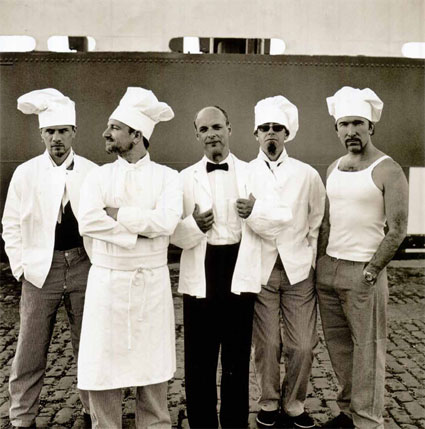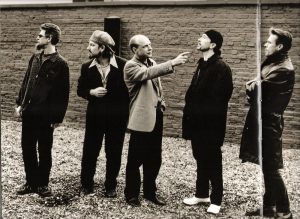Not only does his brilliance shine in his collaborations, he’s also good at coming up with words.
Heard of the term “ambient music“? He came up with it.
Heard of the word “Scenius”? Probably not. He came up with it.

Who Are These Chefs hanging out with Brian Eno?
Brian Eno, highly acclaimed ambient musician and producer of such major artists as Talking Heads, David Bowie, and U2, coined this term to debunk the notion of genius.. He explains,
“I was (previously) encouraged to believe that there were a few great figures like Picasso and Kandinsky, Rembrandt and Giotto and so on who sort-of appeared out of nowhere and produced artistic revolution. As I looked at art more and more, I discovered that that wasn’t really a true picture. What really happened was that there was sometimes very fertile scenes involving lots and lots of people – some of them artists, some of them collectors, some of them curators, thinkers, theorists, people who were fashionable and knew what the hip things were – all sorts of people who created a kind of ecology of talent (emphasis mine). And out of that ecology arose some wonderful work…I thought that originally those few individuals who’d survived in history – in the sort-of ’Great Man’ theory of history – they were called ’geniuses’. But what I thought was interesting was the fact that they all came out of a scene that was very fertile and very intelligent.” (Eno, 2009)
Eno’s point is to help us look beyond ourselves as standalones, but rather as individuals within context that can facilitate creativity and growth.
U2, with the man behind some of their best albums.
Transporting from music to therapy, while solitary deliberate practice is necessary, it isn’t sufficient. If the voluminous amount of self-help books published each year is a reflection of our appetite, we are certainly persuaded that we got to “make it on our own.” The pursuit of excellence is not a solo endeavor. As such, the development of a psychotherapist is not an individual enterprise.
Here’s How:
1. Surround yourself with people who inspires and brings life to you. Seek them out;
2. Open yourself to the scrutiny of watching your therapy session recordings. Do likewise with your colleagues;
3. Seek out therapists (maybe even non-therapists) whom you admire. Talk to them. Find out what inspires them, and what sort of sweat, blood and tears they go through to get good at their craft. Don’t just scrutinise their outputs (i.e., performance). Zoom in on their inputs (i.e., practice routines, systems, what they read, what they are working on, how they work on it).
I am a better version of me when I’m surrounded by a community of folks who add life to life. These people don’t have to think like you, share the same ideas, or may not even be likable by others. If we all think alike, no one thinks at all.
We can’t change those who are around us, but we can change who are around us.
Seek out to be part of an ecology of talent – a scenius community that fosters excellence. No therapist is an island.
So I would like to know how do you become part of such a forward moving community? How do you get to surround yourself with people who draw out the best in you?
Best,
~~~
Further Readings:
1. Check out one of my favorite thinkers of our times, Kevin Kelly’s take on Brian Eno’s notion of on Scenius. If you want to step out of the world of therapy and take a glimpse of what the future hold, listen to this guy. He’s one of the pioneers of the internet. I highly recommend his latest book, The Inevitable: Understanding the 12 Technological Forces That Will Shape Our Future
2. If you are trying to break out of your comfort zone and put your work out these in the work, check out Austin Kleon’s book, Show Your Work!: 10 Ways to Share Your Creativity and Get Discovered . He also wrote about the idea of Scenius in this book, &
3. The Cambridge Handbook of Expertise and Expert Performance: Deeply embedded in this seminal edited handbook , there a good chapter on this topic of the role of social encouragement in the development of expertise. Much of the ideas on deliberate practice in various fields are illuminated in this handbook as well.







2 Responses
[…] If we are to over-come each of our own plateaus, it is vital we treat the practice of psychotherapy more of a team sport, and less of an individual effort.(See previous article on Scenius vs Genius. […]
[…] that transfers to generalizable. We need to develop what musician/producer Brian Eno calls a “scenius” community, and tear down this “lone genius” […]